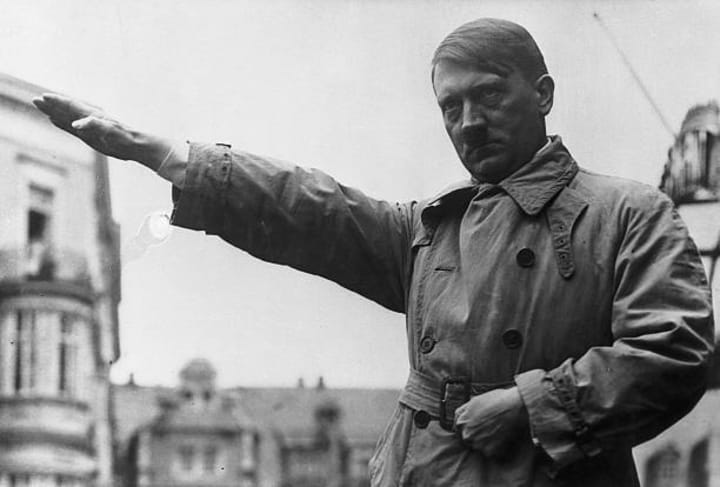
Hitler - The emperor

Adolf Hitler was born on April 20th 1889 in a small Austrian town of Braunau am Inn. Hitler’s father, Alois, was a customs official, and his mother, Klara, was a former maidservant. In 1895, the family moved to the city of Linz, where Hitler would later spend his teenage years.
As a young boy, Hitler was a loner and poor student. He was also a victim of bullying and ridicule at school, and he became increasingly fascinated with German nationalist ideas and anti-Semitism. After his father’s death in 1903, Hitler moved to Vienna and attempted to take up an art career, but he was rejected twice from the Academy of Fine Arts.

In 1913, Hitler moved to Munich in Bavaria and volunteered for the German army in World War I. He was decorated for bravery and achieved the rank of corporal, but during the war he became increasingly disillusioned with the German government, particularly with the Treaty of Versailles which imposed heavy reparations on Germany.
In 1919, Hitler joined the German Workers’ Party (later the Nazi Party) and quickly rose through the party ranks. He quickly became the party’s leader and developed a powerful oratory style that attracted large crowds to his early speeches. In 1921, Hitler was appointed as the Nazi Party’s leader and began to organize the party’s paramilitary wing, the SA.
Under Hitler’s leadership, the Nazi Party became increasingly popular in Germany and made significant gains in the 1932 elections. In 1933, Hitler was appointed Chancellor of Germany and quickly began to establish a totalitarian regime. In 1934, Hitler declared himself Fuhrer (leader) of the Third Reich and began to systematically eliminate his political opponents, consolidate power, and pursue his racial policies.
Hitler’s racial policies were based on his belief in the superiority of the Aryan race and the need to eliminate “inferior” races, particularly Jews. He implemented a series of anti-Semitic laws and policies, including the Nuremberg Laws of 1935 which stripped Jews of their civil rights. He also ordered the extermination of Jews in concentration camps and established a program of forced labor.
Hitler’s aggressive foreign policy contributed to the outbreak of World War II in 1939. He invaded Poland and Austria, annexed Czechoslovakia and invaded France in 1940. By 1941, Hitler had declared war on the Soviet Union and the United States. In 1942, he ordered the extermination of all Jews in Europe.
In 1945, the tide of war turned against Germany and Hitler committed suicide in his bunker in Berlin. In the aftermath of the war, Germany was divided into four occupation zones and the Nuremberg trials were held to prosecute Nazi war criminals.
Hitler’s legacy remains controversial and he is widely considered one of the most evil figures in history. His actions have been widely condemned and he has been blamed for the deaths of millions of people, including Jews, Roma and other persecuted minorities.
Hitler’s life and ideas continue to fascinate an horrify people around the world. His writings, speeches and policies remain widely studied and debated by historians, politicians and ordinary citizens alike. He is still a powerful symbol of tyranny, hatred and genocide, and his legacy continues to haunt the world.
The Death of Adolf Hitler: An Unsolved Mystery

Adolf Hitler, the former leader of Nazi Germany, died on April 30, 1945. However, the circumstances surrounding his death are still shrouded in mystery and speculation. Despite extensive research and investigation, the exact details of Hitler's final moments remain unknown, leading some to believe that his death was staged and that he escaped to live out the rest of his life in hiding.
On April 30, 1945, Hitler and his wife, Eva Braun, retreated to a bunker beneath the Reich Chancellery in Berlin as the Soviet Red Army approached the city. Hitler was said to be in poor health and increasingly erratic in his behavior, leading some to speculate that he may have been suffering from Parkinson's disease or another debilitating illness.
On the morning of April 30, Hitler's deputy, Joseph Goebbels, announced that Hitler had died by his own hand. According to Goebbels, Hitler had shot himself in the head while Braun ingested cyanide. The bodies were reportedly burned in the bunker's garden to prevent their capture by the Soviets.
However, the details surrounding Hitler's death have been the subject of much debate and speculation. Some have questioned the veracity of Goebbels' account, pointing out that no eyewitnesses to Hitler's death have ever come forward. Additionally, the lack of concrete evidence, such as a bullet or teeth fragments, has led some to question whether Hitler truly died in the bunker.
In the years since Hitler's death, numerous conspiracy theories have emerged suggesting that he did not die in the bunker and instead escaped to South America or elsewhere. These theories are often based on alleged sightings of Hitler or on claims that he lived out the rest of his life in hiding.
However, there is little concrete evidence to support these theories, and many experts dismiss them as baseless speculation. The lack of concrete evidence has also made it difficult to definitively disprove these claims, leading some to believe that the truth about Hitler's death may never be known.

In conclusion, the death of Adolf Hitler remains one of the great mysteries of the 20th century. Despite extensive investigation and research, the exact circumstances surrounding his final moments remain unknown, leading some to believe that the truth may never be revealed. Whether or not Hitler died in the bunker on April 30, 1945, remains a subject of much speculation and debate, and his death will likely continue to be a source of fascination for years to come.
About the Creator
Curiosity Ticket
Welcome to curiosity ticket, where we bring you the most fascinating and mind-blowing facts from around the world! Our team of experts is dedicated to delivering the most interesting and educational content, covering a wide range.
Reader insights
Good effort
You have potential. Keep practicing and don’t give up!
Top insight
Easy to read and follow
Well-structured & engaging content






Comments (1)
🙄